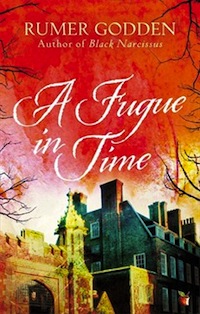You won’t believe how delighted and astonished I am to see A Fugue in Time back in print. It’s been out of print and impossible to find for my whole lifetime. I’ve only owned it myself for a relatively short time (thank you for finding it for me, Janet!), and it’s probably the book I have most frequently read from libraries. It’s in print! And I can therefore recommend it in good conscience!
A Fugue in Time is one of those books I could easily talk about without re-reading, because I love it so much and know it so well. But as soon as I thought about doing that I realised that no, I could give myself the treat of reading it again. It’s not a very long book, after all.
It’s genuinely hard to pin down as to genre. It was published in 1945 and set in 1941, but it covers the years from 1841 to 2000. It’s arguably science fiction and contains science fictional assumptions about the future, though it was published initially and republished now as standard mainstream fiction. What makes it especially interesting is the way it is written as if all that time is taking place at the same moment—the use of tenses and of interwoven plots in different generations of the same family is really quite amazing.
Probably you’ve never heard of it, because it’s been so out of print and because Godden’s mostly popular for some children’s books that are nothing like this. When I talked about In This House of Brede there were a couple of people who had read it, but that book has been much more available than A Fugue In Time. It’s curious, because it’s the kind of book I’d expect a lot of people to enjoy. It isn’t really science fiction of course, despite the bits set in the projected future. It’s not an adventure in any way. Godden’s focus, as in the later China Court, is on a family in a house. China Court has five generations, and a better intersection of past mystery with present day resolution. But I do love the way A Fugue In Time really is a fugue, with the themes repeating in different keys.
There’s a story—a love story that unwinds through time. More than one love story, and they all come together at the end. And there’s a house and time and a family in the house and in time. It’s a sweeter book than China Court and less problematic.
The first theme is female possibility. And the most interesting thing about this theme is that Godden was writing in 1944. So she’s very aware of how much better things were than a hundred years before, how many more options Grizel has than her grandmother Griselda, but she can’t really see how Grizel is herself contained in what her time allows her to be. But we have Griselda, Selina, Lark and Grizel, all themes in the fugue of female possibility.
Secondly we have social consciousness—class consciousness. Godden was writing at a time when a new social contract was in the process of being written in the UK, and she was writing as a member of the privileged class who welcomes the change, which makes her unusual. She imagines it going even further in the projected future—Eton being for scholars rather than for the rich, and Grizel’s milkman’s son going there. This is a story about the middle class characters, but the servants are actually visible and actually people with motivations.
Thirdly we have the theme of being of use—this intertwines with the others and is central.
And then there’s continuity—the family, life, music, the house.
This is a book that can be hard to understand when you first read it, because of the way it’s written, but it’s very rewarding to come back to.
In the interests of full disclosure, I love Godden’s method of writing about everything as if it happens at the same time so much that I used it in my novel Lifelode, coming soon as an affordable e-book.
Jo Walton is a science fiction and fantasy writer. She’s published two poetry collections and nine novels, most recently the Hugo and Nebula winning Among Others. She reads a lot, and blogs about it here regularly. She comes from Wales but lives in Montreal where the food and books are more varied.










